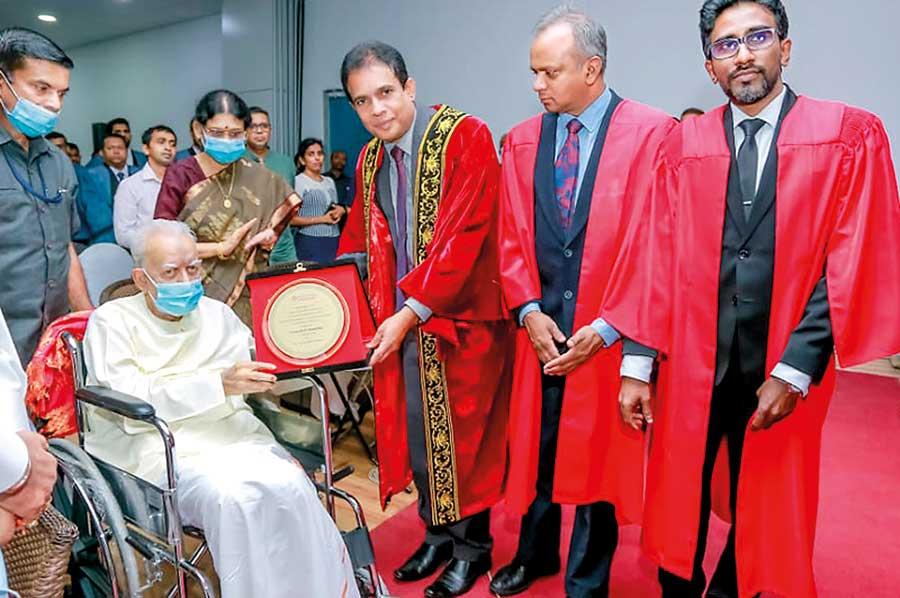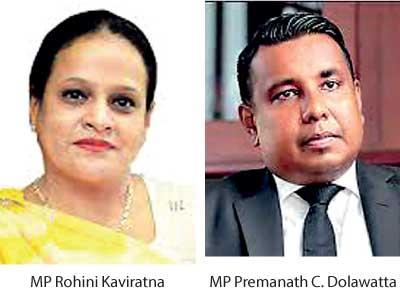14 Nov 2022 - {{hitsCtrl.values.hits}}

TNA Leader R. Sampanthan (seated on wheelchair) is presented with the ‘Gold Award for Democracy’ by Institute of Politics’ Chairman Prof. Aminda Methsila Perera at the awards ceremony held at Sri Lanka Foundation in Colombo
Sampanthan’s senior status in the Tamil society ensures that he is reliably re-elected to parliament. Therefore, the Gold Award presented to Sampanthan in recognition of being a seasoned and wise political leader and for his unwavering devotion to the Tamil community comes across as a landmark in history
R. Sampanthan, Leader of the Tamil National Alliance (TNA) and a former opposition leader, was presented with the Institute of Politics’ “Gold Award for Democracy”. 
He was presented with the country’s highest honour, given only once every few years to a senior political leader for his or her unwavering dedication to the country’s democracy. Sampanthan’s senior status in the Tamil society ensures that he is reliably re-elected to parliament. Therefore, the Gold Award presented to Sampanthan in recognition of being a seasoned and wise political leader and for his unwavering devotion to the Tamil community comes across as a landmark in history.
The Institute of Politics is a professional organization that offers courses in politics, governance, democracy and public policy. In order to produce future political leaders and activists with a deep understanding of politics and political leadership, it runs a variety of programmes to build on ethics relevant to the professional activities of individuals involved in politics as well as to enhance their knowledge, abilities and attitudes.
Sampanthan and many other politicians were presented with awards at the Institute’s Annual Diploma Ceremony at the Sri Lanka Foundation in Colombo on November 05. At the ceremony, 75 diploma recipients who finished government, democracy and policy courses were bestowed with honour.
Sampanthan is the sole member of parliament who comes from the generation that fought for liberation, according to Institute Chairman Prof. Aminda Methsila Perera.
Some of the others who were honoured were Premanath C. Dolawatta, a member of parliament from Sri Lanka Podujana Peramuna, who represents the Colombo District, and Rohini Kaviratna, a member of parliament from Samagi Jana Balawegaya (SJB), who represents the Matale District as the Best Male Member of Parliament and the Best Female Member of Parliament for the Year respectively.
Colombo District SLPP MP Premanath C. Dolawatta and SJB MP for Matale District , Rohini Kaviratna were awarded the Best Male Member of Parliament and the Best Female Member of Parliament for the Year respectively
Being a ray of hope for the democratic system for gender equality in Sri Lanka, MP Kavirtna was also nominated as the Deputy Speaker by the SJB. Unfortunately, the House was divided  on her nomination due to typical party politics at work, which overshadowed the fresh attempts to bring parliament together to address the unique difficulties facing the nation. The Sri Lankan legislature lost an opportunity to elect a female MP to a key position in parliament for the first time because of the country’s longstanding divisive politics.
on her nomination due to typical party politics at work, which overshadowed the fresh attempts to bring parliament together to address the unique difficulties facing the nation. The Sri Lankan legislature lost an opportunity to elect a female MP to a key position in parliament for the first time because of the country’s longstanding divisive politics.
In a historic first for Sri Lanka, MP Rohini Kaviratna, tabled a private motion’s bill in parliament to outlaw the bogus conversion therapy used by unlicensed clinics to “cure” LGBTQI individuals. she was in the view that parliament must intervene on behalf of the lesbian, gay, bisexual, transgender, queer and intersex (LGBTQI) people to put an end to this practice which causes immense psychological distress to those that undergo it.
MP Dolawatta also handed a bill to amend the Penal Code with the aim of protecting the rights of the LGBTQ+ communities in Sri Lanka. The bill was submitted as a Private Member’s Bill in August this year.
MP Dolawatte also recently presented a motion to modify the Local Authorities Elections Act to distribute 25% of nominations to those under the age of 35. He prescribed to the parliament that newer generations must be allowed to compete.
11 May 2024 21 minute ago
11 May 2024 3 hours ago
10 May 2024 6 hours ago
10 May 2024 9 hours ago
10 May 2024 9 hours ago